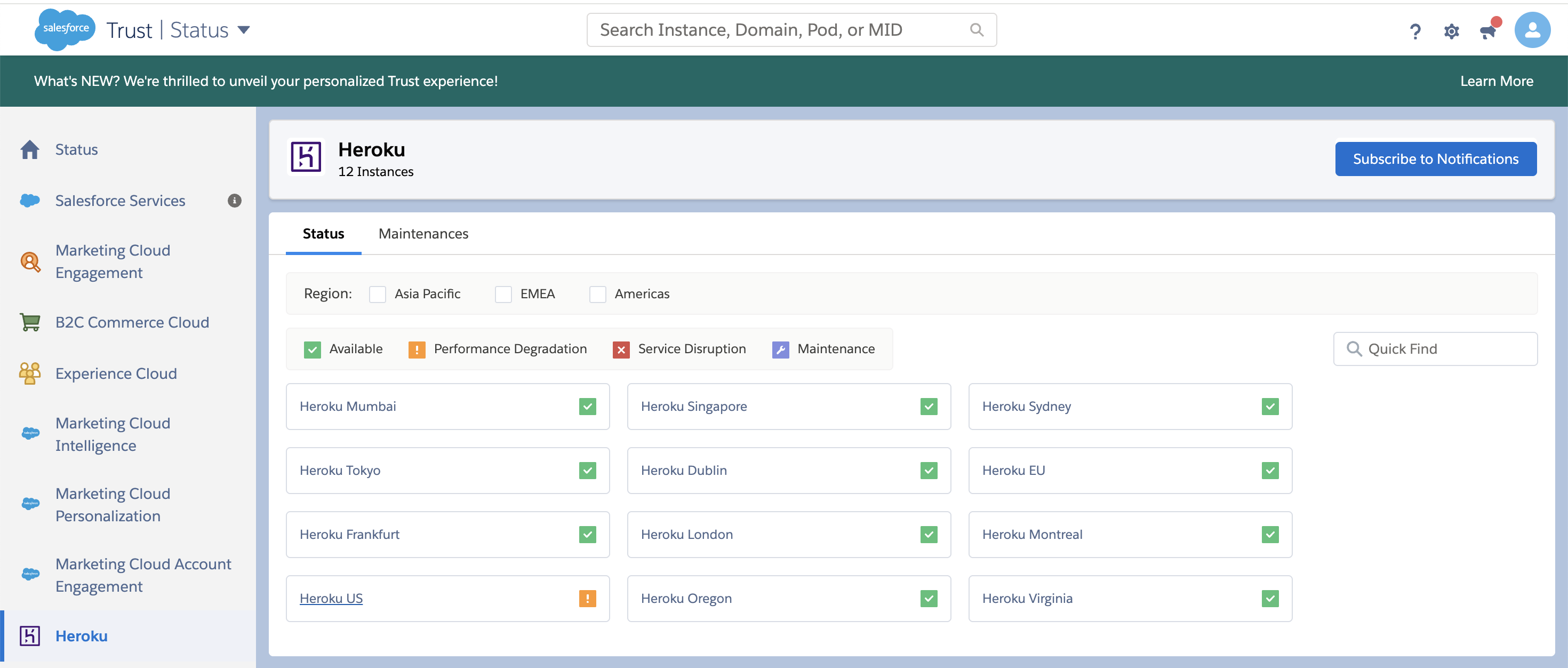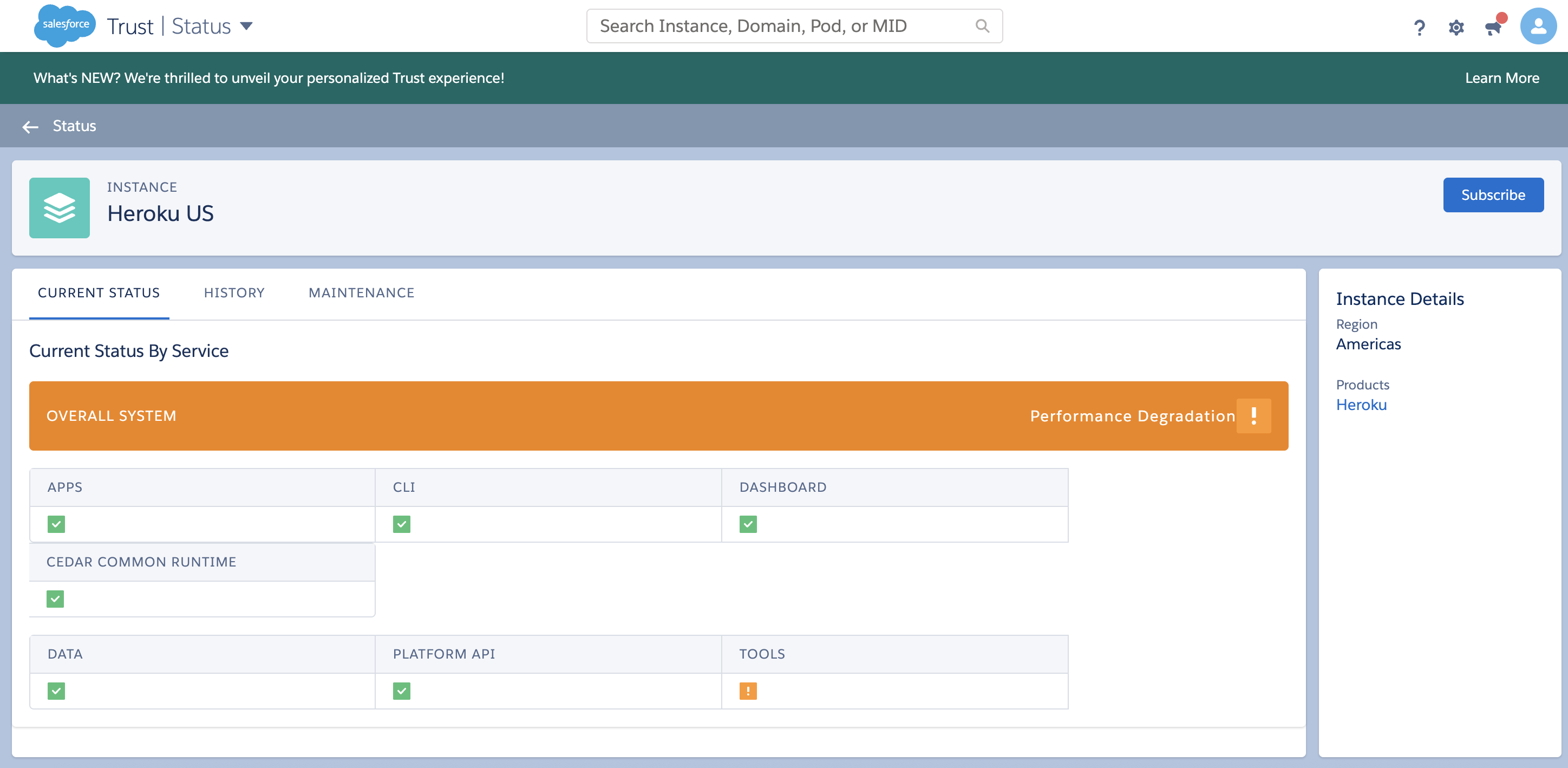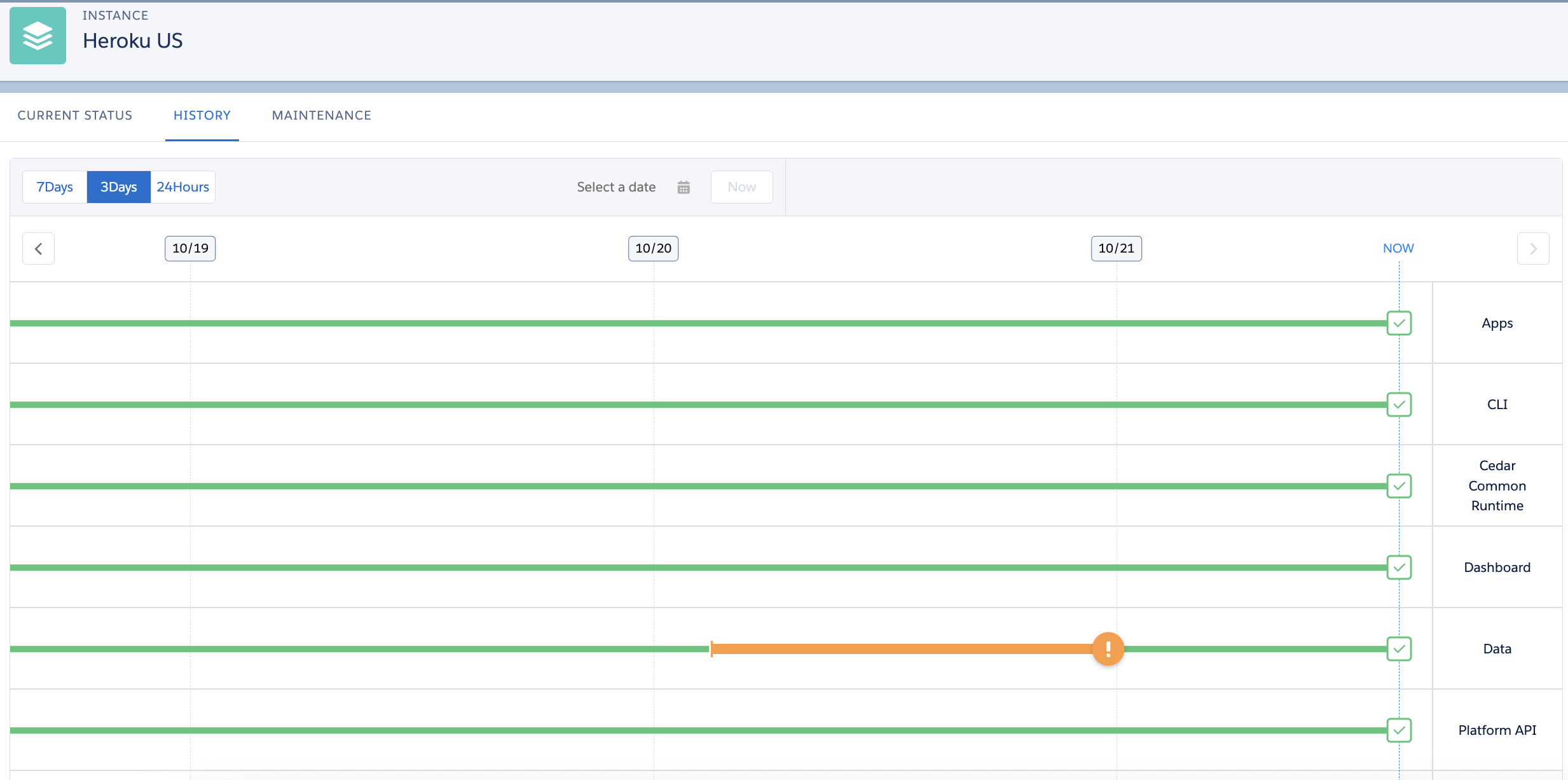Last updated October 21, 2025
The Salesforce Trust site site is now the primary channel for all Heroku incident and maintenance communications.
The Heroku Status site, API, and email notifications will remain in place as a parallel backup incident communications channel until a longer-term strategy is finalized. If integration-impacting changes are scheduled, we’ll give you a minimum of 30-day advanced notice. We’ll update with more migration guidance here.
Dual Posting
As of October 10, 2025, Heroku posts all incident information to both the old https://status.heroku.com site and the new Salesforce Trust site to give our users time to migrate to Salesforce Trust. Although we’ll give at least a 30-day notice before we stop dual posting, we strongly recommend that customers begin to familiarize themselves with the new Salesforce Trust site now.
All existing Heroku Status notification subscriptions were migrated to Salesforce Trust which now sends the notifications. You’ll also continue to receive email alerts for platform issues directly from status.heroku.com until a longer-term strategy is finalized and communicated. After familiarizing yourself with the notifications coming from Salesforce Trust, we encourage you to review your Heroku Status notification subscription and unsubscribe from that system.
Status Information - Salesforce Trust Site
The Salesforce Trust - Heroku site shows the current status of the Heroku platform. Ongoing issues are indicated by an icon and contain a link to more detailed information about the incident.

| Status | Description |
|---|---|
| Available | The service running on the instance is available. |
| Performance Degradation | The service is available, but not running at optimal performance. |
| Service Disruption | The service is unavailable. |
| Maintenance | The service is undergoing maintenance. |
View the Status of Regions (Instances)
The initial page shows each Heroku region, referred to as ”instances”. The icon beside each region indicates its status. For example, if there’s performance degradation occurring in the Heroku US region:

Select a region to show which services have incidents or maintenances.
View the Status of Services
Select a region to show the status of Heroku services within that region:

How Services are Organized
Each instance/region’s services are organized as different areas of functionality within Heroku:
- Apps
- Cedar Common Runtime
- Cedar Private Spaces
- Fir Private Spaces
- CLI
- Dashboard
- Data
- Platform API
- Tools
Details on Service Groupings
Apps Service
The Apps Service represents components of Heroku that affect running, stable applications that have at least two web dynos or use a non-Essential-tier database (or no database at all).
Components include:
Data Service
The Data Service represents components of Heroku that affect the health of Heroku data products.
Components include:
Tools Service
The Tools Service represents components of Heroku that affect developer workflow and management tools.
Components include:
- Git-push deployments and the Deployment API
- GitHub integration
- Logging and telemetry
- Unidling Eco dynos
On the Heroku Status site, this category encompasses API, CLI, and the Heroku Dashboard. These components are indicated by their own services on Salesforce Trust.
View the History of Status and Incidents
Select the History tab within each instance to show a history of past statuses and incidents.
- To see your service’s status history for a specific period, start by selecting a date.
- To set a relative time range before that date, select
7 Days,3 Days, or24 Days. - To jump to a specific date, use the calendar.
- To jump to the current date, select
Now. To advance or backtrack through the timeline, click<or>.

View the Recent and Upcoming Maintenances
Select the Maintenance tab within each instance to show any recent or upcoming maintenances scheduled.
For more details about a specific maintenance window, select its ID. It shows which services are affected by the maintenance, the window’s start time, and more.
Accessing the Heroku Status Site
Until further notice, you can continue to check the current status of platform incidents and maintenance at:
https://status.salesforce.com/products/Heroku(new status site)https://status.heroku.com(during the dual-posting period only)
Eventually, status.heroku.com will redirect permanently to the new Salesforce Trust site.
You can continue to use the heroku status command in the Heroku CLI to quickly ascertain the current status. We’ll give you a minimum of 30-day advanced notice if we make any changes to that command.
$ heroku status
=== Heroku Status
Apps: No known issues at this time.
Data: No known issues at this time.
Tools: No known issues at this time.
Status Information - Heroku Status Site
The Heroku Status site includes the current status of the platform, and the most recent incidents, all broken down into three categories: apps, data, and tools.
Incident reporting refreshes every 30 seconds.
Apps and Runtime Issues
Apps and runtime issues are those that affect running, stable applications that have at least two web dynos or use a non-Essential-tier database (or no database at all).
Components include:
- Dynos
- Routing
- Heroku Scheduler
Data Service Issues
Data Service issues are those that affect the health of Heroku data products.
Components include:
- Heroku Postgres
- Heroku Key-Value Store
- Apache Kafka on Heroku
- Heroku Connect
Tools Issues
Tools issues are those that affect developer workflow and management tools.
Components include:
- Git-push deployments and the Deployment API
- GitHub Sync
- API / CLI / Heroku Dashboard (scaling up/down, changing configuration, etc.)
- Logging
- Unidling Eco dynos
The types of platform work that can result in notifications, and the types of notifications are documented in Platform Updates, Maintenance and Notifications.
Getting Notified When There is an Incident
The Salesforce Trust site offers more granular subscription options than Heroku Status, giving you the choice to be notified only of incidents that impact services you use . You can choose specific severity levels for communications across various channels, including email and SMS. Refer to the Trust notification guide for info and instructions.
During the dual posting period, you receive email alerts from both status.heroku.com and Salesforce Trust. When you are ready you can unsubscribe from Heroku Status email notifications.
Actions to Take When You Suspect an Outage
Check Salesforce Trust to determine if there’s a current incident. If nothing’s reported, or if you’re experiencing something different than what’s reported, contact our support team.
Heroku Status API v4
We’ll fully deprecate the existing Heroku Status API (v4), available at https://status.heroku.com/api/v4/current-status and other related endpoints, at some point in the future.
If you use the Heroku Status API for integrations with your third-party systems, we recommend you start updating the integrations to the Salesforce Trust API now. When using the API to gather information about Heroku, the product to reference is Heroku.
We’ll provide a detailed deprecation timeline and developer guides in the near future.
Get Current Status
The Heroku Status API has CORS support, allowing client-side JavaScript requests.
$ curl "https://status.heroku.com/api/v4/current-status"
{"status":[{"system":"Apps","status":"green"},{"system":"Data","status":"green"},{"system":"Tools","status":"green"}],"incidents":[],"scheduled":[]}
Get List of Issues (optionally limited by date or count)
$ curl "https://status.heroku.com/api/v4/incidents?since=2019-11-01&per_page=1"
[{"id":1924,"title":"Logs for some customers were not forwarded to log drains.","state":"resolved","created_at":"2019-11-05T00:00:00.000Z","updated_at":"2019-11-05T00:43:21.770Z","resolved":false,"href":"https://status.heroku.com/api/v4/incidents/1924","full_url":"https://status.heroku.com/incidents/1924","duration":2460,"resolved_at":"2019-11-05T00:41:00.000Z","review":false,"systems":[{"name":"Tools","status":"green","services":["Tools"]}],"tags":["US","US"],"updates":[{"id":6131,"created_at":"2019-11-05T00:41:00.000Z","updated_at":"2019-11-05T00:43:25.093Z","incident_id":1924,"contents":"This incident has been resolved.","title":"Logs for some customers were not forwarded to log drains.","update_type":"resolved","systems":[]},{"id":6130,"created_at":"2019-11-05T00:00:00.000Z","updated_at":"2019-11-05T00:46:01.188Z","incident_id":1924,"contents":"From Oct 30 13:00 UTC until Nov 2 14:00 UTC logs for some customers in US Common Runtime and Virginia Private Spaces were not forwarded to the configured log drain, due to an internal issue with the logging systems dropping logs.","title":"Logs for some customers were not forwarded to log drains.","update_type":"retroactive","systems":[{"name":"Tools","status":"green","services":["Tools"]}]}]}]
Get a Single Issue by ID Number
$ curl "https://status.heroku.com/api/v4/incidents/1924"
{"id":1924,"title":"Logs for some customers were not forwarded to log drains.","state":"resolved","created_at":"2019-11-05T00:00:00.000Z","updated_at":"2019-11-05T00:43:21.770Z","resolved":false,"href":"https://status.heroku.com/api/v4/incidents/1924","full_url":"https://status.heroku.com/incidents/1924","duration":2460,"resolved_at":"2019-11-05T00:41:00.000Z","review":false,"systems":[{"name":"Tools","status":"green","services":["Tools"]}],"tags":["US","US"],"updates":[{"id":6131,"created_at":"2019-11-05T00:41:00.000Z","updated_at":"2019-11-05T00:43:25.093Z","incident_id":1924,"contents":"This incident has been resolved.","title":"Logs for some customers were not forwarded to log drains.","update_type":"resolved","systems":[]},{"id":6130,"created_at":"2019-11-05T00:00:00.000Z","updated_at":"2019-11-05T00:46:01.188Z","incident_id":1924,"contents":"From Oct 30 13:00 UTC until Nov 2 14:00 UTC logs for some customers in US Common Runtime and Virginia Private Spaces were not forwarded to the configured log drain, due to an internal issue with the logging systems dropping logs.","title":"Logs for some customers were not forwarded to log drains.","update_type":"retroactive","systems":[{"name":"Tools","status":"green","services":["Tools"]}]}]}